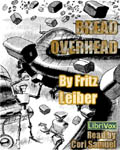
Yes it is the time of year when singing about aerial caribou with magically glowing proboscises is deemed highly appropriate. Ya.
If you’ve always been more of a Science Fiction fan than a Fantasy fan then maybe this song is for you…
 Chiron Beta Prime
Chiron Beta Prime
Lyrics by Jonathon Coulton; Performed by Jonathon Coulton
1 |MP3| – Approx. 3 Minutes [CHRISTMAS MUSIC]
Provider: JonathonCoulton.com
Created: 2006
A delightful song along the lines of what’s-new-with-us-this-year-type Christmas card.
And here are the lyrix so you can practice up for the mandated robot overlord caroling session…
This year has been a little crazy for the Andersons.
You may recall we had some trouble last year.
The robot council had us banished to an asteroid.
That hasn’t undermined our holiday cheer.
And we know it’s almost Christmas from the marks we make on the wall.
And that’s our favorite time of year.Merry Christmas from Chiron Beta Prime,
where we’re working in a mine for our robot overlords.
Did I say overlords? I meant protectors.
Merry Christmas from Chiron Beta Prime.On every corner there’s a giant metal Santa Claus who watches over us with glowing red eyes.
They carry weapons and they know if you’ve been bad or good.
Not everybody’s good but everyone tries.
And the rocks outside the airlock exude ammonia-scented snow.
It’s like a Winter wonderland.Merry Christmas from Chiron Beta Prime,
where we’re working in a mine for our robot overlords.
Did I say overlords? I meant protectors.
Merry Christmas from Chiron Beta Prime.That’s all the family news that we’re allowed to talk about.
We really hope you’ll come and visit us soon.
I mean we’re literally begging you to visit us.
And make it quick before they [MESSAGE REDACTED].
Now it’s time for Christmas dinner – I think the robots sent us a pie!
You know I love my soylent green.Merry Christmas from Chiron Beta Prime,
where we’re working in a mine for our robot overlords.
Did I say overlords? I meant protectors.
Merry Christmas from Chiron Beta Prime.
And here’s the LIVE version |MP3|
Posted by Jesse Willis


 A “few” short hidden gems from
A “few” short hidden gems from 



